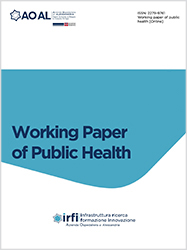Impact of a physical activity program for psychophysical well-being in the dialysed and transplanted patient: a pilot study
All claims expressed in this article are solely those of the authors and do not necessarily represent those of their affiliated organizations, or those of the publisher, the editors and the reviewers. Any product that may be evaluated in this article or claim that may be made by its manufacturer is not guaranteed or endorsed by the publisher.
Authors
Background: Chronic Kidney Disease (CKD) is a worldwide health problem. This study evaluated the effects of Nordic Walking on health and quality of life in patients with CKD.
Materials and Methods: single-centre, non-pharmacological, single-arm pilot study in 15 patients undergoing haemodialysis, peritoneal dialysis, or kidney transplantation. The intervention consisted of 22 Nordic Walking sessions over two and a half months. Pre- and post-intervention assessments included blood pressure, oxygen saturation, bioimpedance analysis, and quality of life. Statistical analysis was performed using Wilcoxon's T-test, with significance p<0.05.
Results: improvements were observed in blood pressure (137.5±19.6 mmHg at T0 vs 130.8±16.3 mmHg at T1, p=0.03), SpO2 (98.5±0.6% vs 99.1±0.3%, p=0.02) and HDL cholesterol (48.8±11.1 mg/dL vs 54.9±19.6 mg/dL, p=0.05). Lean mass increased (73.7±8.9% to 76.1±9.8%, p=0.04) while fat mass decreased (26.3± .9% to 23.9±9.8%, p=0.04). Quality of life scores improved significantly (76.6±14.4 at T0 vs 87.8±6.9 at T1, p=0.01).
Conclusions: Nordic Walking improved cardiovascular health and quality of life in people with CKD. More research is needed to confirm these findings.
How to Cite

This work is licensed under a Creative Commons Attribution-NonCommercial 4.0 International License.







